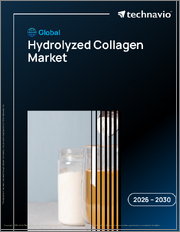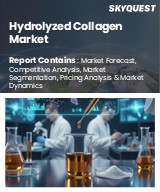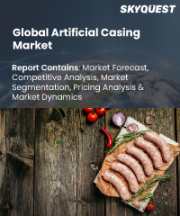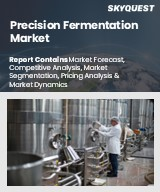
|
시장보고서
상품코드
1800279
콜라겐 시장 : 예측(2025-2030년)Collagen Market - Forecasts fom 2025 to 2030 |
||||||
세계의 콜라겐 시장 규모는 CAGR 5.27%로 성장할 전망이며, 2025년 67억 3,800만 달러에서 2030년에는 87억 1,200만 달러로 성장할 것으로 예측됩니다.
세계의 콜라겐 시장은 콜라겐의 겔화, 유화, 결합 특성에 의해 식음료, 헬스케어, 화장품 산업에 대한 수요 증가로 2025-2030년 강력한 성장을 이룰 것으로 예측되고 있습니다. 중요한 구조 단백질인 콜라겐은 조직 형성, 치유, 전반적인 건강을 지원하며 뼈 이식, 조직 공학, 안티-에이징 제품 등의 용도에 필수적입니다. 이 시장은 콜라겐의 건강상의 이점에 대한 소비자 의식 증가, 간편한 식품에 대한 수요 증가, 식물 유래의 콜라겐의 대체품을 요구하는 비건 인구의 확대에 의해 추진되고 있습니다. 아시아태평양은 큰 성장이 예상되지만 북미와 유럽은 여전히 주요 시장입니다. 과제로는 동물 유래의 콜라겐에 대한 규제상의 제한이나 종교상의 제약 등을 들 수 있습니다.
시장 성장 촉진요인
식음료 업계 수요 증가
식음료 부문은 콜라겐 시장의 주요 촉진요인으로, 콜라겐의 기능 특성을 간편 식품, 스낵, 영양 보조 식품 등의 제품에 활용하고 있습니다. 콜라겐은 구미, 음식, 단백질 바 등의 식감과 안정성을 향상시켜 편리하고 건강에 좋은 음식을 선호하는 소비자 증가에 대응하고 있습니다. 관절 건강과 전반적인 건강을 지원하는 기능성 식품으로의 전환은 특히 영양과 편의성을 중시하는 다이어트 동향의 선진국 시장과 신흥국 시장에서 콜라겐 채용을 뒷받침하고 있습니다.
헬스케어에서 용도 확대
콜라겐의 헬스케어에서의 역할은 뼈 이식, 조직 공학 및 치과 수술에서의 사용으로 확대되고 있습니다. 그 생체 적합성과 재생 특성에 의해 특히 관절통이나 면역력의 저하 등 노화와 관련된 증상을 일으키기 쉬운 고령자층에의 의료 용도에 빠뜨릴 수 없는 것이 되고 있습니다. 상처 치유 및 정형외과 치료에서 콜라겐의 이점에 대한 인지도 증가는 의료 제공업체가 환자의 결과를 개선하기 위해 고급 생체 재료를 요구하고 있기 때문에 수요를 견인하고 있습니다.
화장품 업계와 비건 동향
화장품 업계는 콜라겐이 피부의 탄력성과 보습을 개선하는 능력을 가지고 있기 때문에 안티 에이징이나 피부의 회춘 제품에 널리 사용되고 있으며, 중요한 촉진요인이 되고 있습니다. 또한, 비건 및 채식주의 인구가 증가함에 따라 필수 아미노산을 풍부하게 포함하는 식물 유래의 콜라겐 대체품에 대한 수요가 높아지고 있으며, 동물 이외 식사에서의 영양 갭에 대응하고 있습니다. 이 추세는 화장품과 영양 보충제 모두에서 합성 및 식물 유래 콜라겐 시장을 확대하고 있습니다.
시장 성장 억제요인
콜라겐 시장은 지속가능성 및 윤리적 조달을 우려하는 정부 기관이 부과하는 동물 유래 콜라겐, 특히 소나 돼지 유래 콜라겐에 대한 규제 제한으로 인한 문제에 직면하고 있습니다. 또한 일부 지역에서는 돼지와 소의 콜라겐에 대한 종교적, 문화적 규제가 시장 성장을 제한합니다. 또한, 식물 유래 및 합성 콜라겐 대체품의 생산 비용이 높기 때문에 가격에 민감한 시장 채용을 방해할 수 있습니다. 지속 가능한 조달과 비용 효율적인 생산을 통해 이러한 과제를 해결하는 것이 지속적인 확장에 필수적입니다.
목차
제1장 서론
- 시장 개요
- 시장 정의
- 조사 범위
- 시장 세분화
- 통화
- 전제조건
- 기준 연도 및 예측 연도 타임라인
제2장 조사 방법
- 조사 데이터
- 전제조건
제3장 주요 요약
- 조사 하이라이트
제4장 시장 역학
- 시장 성장 촉진요인
- 시장 성장 억제요인
- Porter's Five Forces 분석
- 업계 밸류체인 분석
제5장 콜라겐 시장 : 공급원별
- 서문
- 소
- 돼지
- 가금
- 해산물
제6장 콜라겐 시장 : 용도별
- 서문
- 식품 및 음료
- 헬스케어 제품
- 화장품
- 기타
제7장 콜라겐 시장 : 지역별
- 서문
- 북미
- 미국
- 캐나다
- 멕시코
- 남미
- 브라질
- 아르헨티나
- 기타
- 유럽
- 독일
- 프랑스
- 영국
- 스페인
- 기타
- 중동 및 아프리카
- 사우디아라비아
- 아랍에미리트(UAE)
- 이스라엘
- 기타
- 아시아태평양
- 중국
- 일본
- 인도
- 한국
- 인도네시아
- 대만
- 기타
제8장 경쟁 환경 및 분석
- 주요 기업 및 전략 분석
- 신흥 기업 및 시장 수익성
- 합병, 인수, 협정 및 협업
- 벤더 경쟁력 매트릭스
제9장 기업 프로파일
- Nutra Food Ingredients
- Connoils LLC
- Nitta Gelatin
- Weishardt Holding SA
- PB Leiner
- Vital Proteins LLC
- Nippi Inc
- Gelita AG
- Lapi Gelatine SPA
- Vinh Hoan Corporation
- Kenny & Ross Ltd.
- Amicogen Inc
- Titan Biotech Ltd
- Rousselot
- Crescent Biotech
The Collagen Market is expected to grow from USD 6.738 billion in 2025 to USD 8.712 billion in 2030, at a CAGR of 5.27%.
The global collagen market is projected to experience robust growth from 2025 to 2030, driven by increasing demand in food and beverage, healthcare, and cosmetic industries, fueled by collagen's gelling, emulsifying, and binding properties. As a critical structural protein, collagen supports tissue formation, healing, and overall well-being, making it essential in applications like bone grafting, tissue engineering, and anti-aging products. The market is propelled by rising consumer awareness of collagen's health benefits, growing demand for convenience foods, and an expanding vegan population seeking plant-based collagen alternatives. Asia-Pacific is expected to show significant growth, while North America and Europe remain key markets. Challenges include regulatory restrictions on animal-derived collagen and religious constraints.
Market Drivers
Rising Demand in Food and Beverage Industry
The food and beverage sector is a primary driver of the collagen market, leveraging collagen's functional properties in products like convenience foods, snacks, and nutritional supplements. Collagen enhances texture and stability in items such as gummies, beverages, and protein bars, aligning with the growing consumer preference for convenient, health-focused foods. The shift toward functional foods that support joint health and overall wellness is boosting collagen adoption, particularly in developed and emerging markets where dietary trends emphasize nutrition and convenience.
Growing Applications in Healthcare
Collagen's role in healthcare is expanding due to its use in bone grafting, tissue engineering, and dental surgeries. Its biocompatibility and regenerative properties make it vital for medical applications, particularly for the geriatric population prone to age-related conditions like joint pain and reduced immunity. Increasing awareness of collagen's benefits in wound healing and orthopedic treatments is driving demand, as healthcare providers seek advanced biomaterials to improve patient outcomes.
Cosmetic Industry and Vegan Trends
The cosmetic industry is a significant growth driver, with collagen widely used in anti-aging and skin rejuvenation products due to its ability to improve skin elasticity and hydration. Additionally, the rising vegan and vegetarian population is fueling demand for plant-based collagen alternatives rich in essential amino acids, addressing nutritional gaps in non-animal diets. This trend is expanding the market for synthetic and plant-derived collagen in both cosmetics and dietary supplements.
Market Restraints
The collagen market faces challenges due to regulatory restrictions on animal-derived collagen, particularly bovine and porcine sources, imposed by government organizations concerned about sustainability and ethical sourcing. Religious and cultural restrictions on porcine and bovine collagen in certain regions also limit market growth. Additionally, high production costs for plant-based and synthetic collagen alternatives can hinder adoption in price-sensitive markets. Addressing these challenges through sustainable sourcing and cost-effective production will be critical for sustained expansion.
Market Segmentation
By Source
The market is segmented into bovine, porcine, poultry, and marine collagen. Marine collagen is gaining traction due to its high bioavailability and sustainability, while bovine and porcine remain dominant in traditional applications. Poultry collagen is emerging in niche markets.
By Application
The market includes food and beverages, healthcare products, cosmetics, and others. Food and beverages lead due to collagen's use in functional foods and supplements. Healthcare and cosmetics are fast-growing segments, driven by medical and anti-aging applications.
By Geography
The market is segmented into North America, Asia-Pacific, Europe, South America, and the Middle East and Africa. Asia-Pacific is expected to grow rapidly, driven by rising consumer awareness, urbanization, and demand for health-focused products in countries like China and India. North America and Europe hold significant shares due to established healthcare and cosmetic industries, while South America and the Middle East and Africa are emerging markets.
The collagen market is set for robust growth from 2025 to 2030, driven by demand in food and beverage, healthcare, and cosmetic applications, fueled by consumer health awareness and vegan trends. Despite challenges like regulatory restrictions and production costs, the market's outlook is positive, particularly in Asia-Pacific. Industry players must focus on sustainable, innovative collagen sources and cost-effective solutions to capitalize on the growing demand for collagen-based products across diverse industries.
Key Benefits of this Report:
- Insightful Analysis: Gain detailed market insights covering major as well as emerging geographical regions, focusing on customer segments, government policies and socio-economic factors, consumer preferences, industry verticals, and other sub-segments.
- Competitive Landscape: Understand the strategic maneuvers employed by key players globally to understand possible market penetration with the correct strategy.
- Market Drivers & Future Trends: Explore the dynamic factors and pivotal market trends and how they will shape future market developments.
- Actionable Recommendations: Utilize the insights to exercise strategic decisions to uncover new business streams and revenues in a dynamic environment.
- Caters to a Wide Audience: Beneficial and cost-effective for startups, research institutions, consultants, SMEs, and large enterprises.
What do businesses use our reports for?
Industry and Market Insights, Opportunity Assessment, Product Demand Forecasting, Market Entry Strategy, Geographical Expansion, Capital Investment Decisions, Regulatory Framework & Implications, New Product Development, Competitive Intelligence
Report Coverage:
- Historical data from 2020 to 2024 & forecast data from 2025 to 2030
- Growth Opportunities, Challenges, Supply Chain Outlook, Regulatory Framework, and Trend Analysis
- Competitive Positioning, Strategies, and Market Share Analysis
- Revenue Growth and Forecast Assessment of segments and regions including countries
- Company Profiling (Strategies, Products, Financial Information, and Key Developments among others.
Different segments covered under the collagen market report are as below:
By Source
- Bovine
- Porcine
- Poultry
- Marine
By Application
- Food & Beverages
- Healthcare Products
- Cosmetics
- Others
By Geography
- North America
- United States
- Canada
- Mexico
- South America
- Brazil
- Argentina
- Others
- Europe
- United Kingdom
- Germany
- France
- Spain
- Others
- Middle East and Africa
- Saudi Arabia
- UAE
- Israel
- Others
- Asia Pacific
- Japan
- China
- India
- South Korea
- Indonesia
- Thailand
- Others
TABLE OF CONTENTS
1. INTRODUCTION
- 1.1. Market Overview
- 1.2. Market Definition
- 1.3. Scope of the Study
- 1.4. Market Segmentation
- 1.5. Currency
- 1.6. Assumptions
- 1.7. Base, and Forecast Years Timeline
2. RESEARCH METHODOLOGY
- 2.1. Research Data
- 2.2. Assumptions
3. EXECUTIVE SUMMARY
- 3.1. Research Highlights
4. MARKET DYNAMICS
- 4.1. Market Drivers
- 4.2. Market Restraints
- 4.3. Porter's Five Force Analysis
- 4.3.1. Bargaining Power of Suppliers
- 4.3.2. Bargaining Power of Buyers
- 4.3.3. Threat of New Entrants
- 4.3.4. Threat of Substitutes
- 4.3.5. Competitive Rivalry in the Industry
- 4.4. Industry Value Chain Analysis
5. COLLAGEN MARKET, BY SOURCE
- 5.1. Introduction
- 5.2. Bovine
- 5.3. Porcine
- 5.4. Poultry
- 5.5. Marine
6. COLLAGEN MARKET, BY APPLICATION
- 6.1. Introduction
- 6.2. Food & Beverages
- 6.3. Healthcare Products
- 6.4. Cosmetics
- 6.5. Others
7. COLLAGEN MARKET, BY GEOGRAPHY
- 7.1. Introduction
- 7.2. North America
- 7.2.1. USA
- 7.2.2. Canada
- 7.2.3. Mexico
- 7.3. South America
- 7.3.1. Brazil
- 7.3.2. Argentina
- 7.3.3. Others
- 7.4. Europe
- 7.4.1. Germany
- 7.4.2. France
- 7.4.3. United Kingdom
- 7.4.4. Spain
- 7.4.5. Others
- 7.5. Middle East And Africa
- 7.5.1. Saudi Arabia
- 7.5.2. UAE
- 7.5.3. Israel
- 7.5.4. Others
- 7.6. Asia Pacific
- 7.6.1. China
- 7.6.2. Japan
- 7.6.3. India
- 7.6.4. South Korea
- 7.6.5. Indonesia
- 7.6.6. Taiwan
- 7.6.7. Others
8. COMPETITIVE ENVIRONMENT AND ANALYSIS
- 8.1. Major Players and Strategy Analysis
- 8.2. Emerging Players and Market Lucrativeness
- 8.3. Mergers, Acquisitions, Agreements, and Collaborations
- 8.4. Vendor Competitiveness Matrix
9. COMPANY PROFILES
- 9.1. Nutra Food Ingredients
- 9.2. Connoils LLC
- 9.3. Nitta Gelatin
- 9.4. Weishardt Holding SA
- 9.5. PB Leiner
- 9.6. Vital Proteins LLC
- 9.7. Nippi Inc
- 9.8. Gelita AG
- 9.9. Lapi Gelatine SPA
- 9.10. Vinh Hoan Corporation
- 9.11. Kenny & Ross Ltd.
- 9.12. Amicogen Inc
- 9.13. Titan Biotech Ltd
- 9.14. Rousselot
- 9.15. Crescent Biotech



















